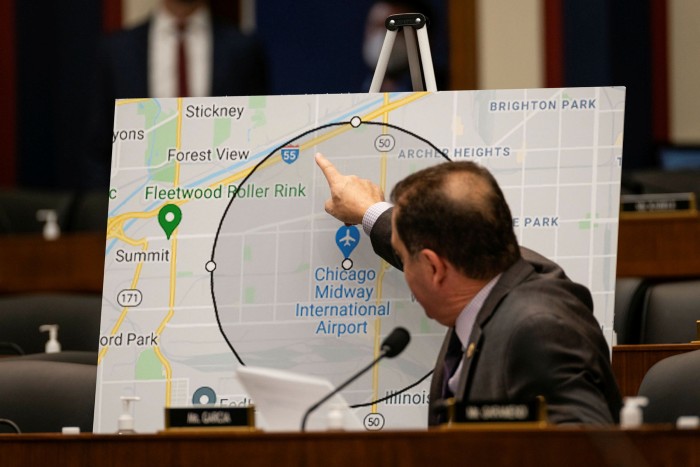[ad_1]
International wrangling over standards for 5G technology is not only about improved speed or efficiency. Such standards also reflect the political struggles between the US and China — and, to a lesser degree, Europe — over how future technology is developed and deployed.
“5G has been described as essential for economic progress,” says Priya Chopra, head of network technology for communications, media and information for the EU and UK, at Tata Consultancy Services.
Expansion of the technology has also become more important as older networks are increasingly switched off. Vodafone and EE aim to phase out 3G networks in the UK by 2023.
But the standards set for the next generation network — who decides them, and how far they apply — will be equally important for national security and individual safety, as well as the geopolitics of equipment deployment around the world.
Arrangements of technical architecture are arrangements of power
“Arrangements of technical architecture are arrangements of power,” argues Laura DeNardis, a professor in communication at American University, Washington DC specialising in internet governance and infrastructure.
So far, the most obvious casualty of the power struggle has been Huaweithe Chinese technology company. The UK government banned it from supplying equipment in the country after 2021, which hit its revenue and profit.
But Beijing has been prolific in its efforts to set the agenda on 5G — an approach that has challenged US efforts to blacklist Chinese technology.
The costs of this tension are borne not only by Huawei, but by other companies, says Chopra. “Some of the immediate impacts are felt due to Chinese telecom equipment, intensive auditing of telecom products by technical specialists, the review and certification of network technology , and involvement in encryption requirements at application levels.”
DeNardis says one area where establishing standards is vital is the so-called ‘Internet of Things’ — networks of connected devices such as smart speakers and security systems.
“The internet is no longer just about connecting people, it’s also about communications and controls for connected things,” she notes.
Furthermore, the Internet of Things has developed way beyond connected homes, in which residents can turn on the lights from their phones.
Highly connected smart cities are becoming more common. This prompts debates about the measures that should be taken to control the use of technologies such as facial recognition.
There are also questions over safety and security standards embedded into smart cities. A report released in 2020 and funded by the Australian government found that a data centre built by Huawei in Papua New Guinea had serious security vulnerabilities.
Europe is seeking to play a role in establishing connectivity standards. Making 5G available everywhere, and setting the standards for it, are among the “Digital Decade Principles” announced in January by the European Commission, in order to guide digital transformation in the EU.
Also in January, the French and German governments announced €17.7mn in funding for four 5G projects. These included open 5G networks in business parks and 5G solutions for operating theatres, to improve telesupport.
Bruno Le Maire, French minister for the economy, finance and recovery, said the Franco-German ecosystem “will play a key role to position Europe at the forefront of innovation in 5G and its evolutions”.
But 5G standards are not only a question of international geopolitics, says DeNardis. She points to the question of airline flight disruption in the US.
In January, the largest US airlines warned that the imminent introduction of 5G threatened to ground flights across the country by interfering with equipment needed for take-off and landing.

“In no advanced society should the issue of 5G antenna placement be making the news,” DeNardis says. “This should be behind the scenes, not mediated by social media mobs. This is not how tech policy should be done in any way.”
The effect of the fracas, she warns, is to fuel public distrust in 5G, which had previously been more pronounced in Europe.
“This is yet another area of ??anxiety and lack of trust in institutions,” DeNardis says. “This serves to raise the importance of technical standards in society and how they are rules and structures which bleed into important social issues.”
As debate about 5G standards continues, discussions are already under way about its successor, 6G.
“It’s not surprising that this is happening — as standards evolve, they’re recognised as opportunities for nations to prioritise their indigenous companies,” DeNardis adds.
The competition is heating up. A report released in December by the Center for a New American Security, a Washington DC think-tank, recommended that the US craft a 6G strategy, expand funding and increase collaboration with allies in order to avoid a repeat of problems with 5G.
“While the current policy conversation around telecommunications has largely focused on China’s 5G efforts, the United States is engaged in a long-term technology competition that will extend far beyond 5G,” the report noted.
[ad_2]
Source link








